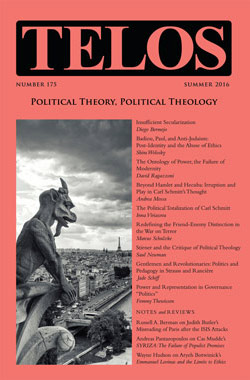Shira Wolosky’s “Badiou, Paul and Anti-Judaism: The Abuse of Ethics” appears in Telos 175 (Summer 2016). Read the full article at the Telos Online website, or purchase a print copy of the issue in our online store.
 Paul has emerged as central to some of the most prominent European intellectuals today, notably Alain Badiou in Saint Paul: The Foundation of Universalism. On the one hand, Badiou claims his philosophy to be a post-metaphysics in accord with postmodern critiques of traditional ontologies. He thus empties Paul of either historical or supernatural content. And yet, Badiou reconstructs what amounts to a secular political theology that strikingly reproduces the dogmatism of metaphysics. As his title announces, Badiou resurrects Paul in the name of universalism. Universalism claims to be, and indeed often is, an attempt to safeguard and respect everyone equally. But in Badiou universalism restages the erasure of difference and multiplicity in human experience that launched metaphysical critique in the first place. As secular venture what he ironically demonstrates is how tenacious traditional metaphysical unity remains even in apparently post-theological discourses. In terms of Paul, Badiou resurrects Pauline tradition at its most dualistic. Universalism becomes aligned with grace, spirit, life, as against particularity, death, flesh, and above all law: which is to say Jews as defined through law. The figure of the Jew emerges as the very essence of particularism, the betrayer of saving universalism. Death, sin, law, letter: these stand in the way of universal truth; and what they stand for is the Jew. But the universal in Badiou emerges as a radical politics of rupture, against institutions, against any social order as oppressive, to be effaced in the name of what remains a metaphysics but as a negative atopia recalling Gnosticism repudiation of the multiple world.
Paul has emerged as central to some of the most prominent European intellectuals today, notably Alain Badiou in Saint Paul: The Foundation of Universalism. On the one hand, Badiou claims his philosophy to be a post-metaphysics in accord with postmodern critiques of traditional ontologies. He thus empties Paul of either historical or supernatural content. And yet, Badiou reconstructs what amounts to a secular political theology that strikingly reproduces the dogmatism of metaphysics. As his title announces, Badiou resurrects Paul in the name of universalism. Universalism claims to be, and indeed often is, an attempt to safeguard and respect everyone equally. But in Badiou universalism restages the erasure of difference and multiplicity in human experience that launched metaphysical critique in the first place. As secular venture what he ironically demonstrates is how tenacious traditional metaphysical unity remains even in apparently post-theological discourses. In terms of Paul, Badiou resurrects Pauline tradition at its most dualistic. Universalism becomes aligned with grace, spirit, life, as against particularity, death, flesh, and above all law: which is to say Jews as defined through law. The figure of the Jew emerges as the very essence of particularism, the betrayer of saving universalism. Death, sin, law, letter: these stand in the way of universal truth; and what they stand for is the Jew. But the universal in Badiou emerges as a radical politics of rupture, against institutions, against any social order as oppressive, to be effaced in the name of what remains a metaphysics but as a negative atopia recalling Gnosticism repudiation of the multiple world.








